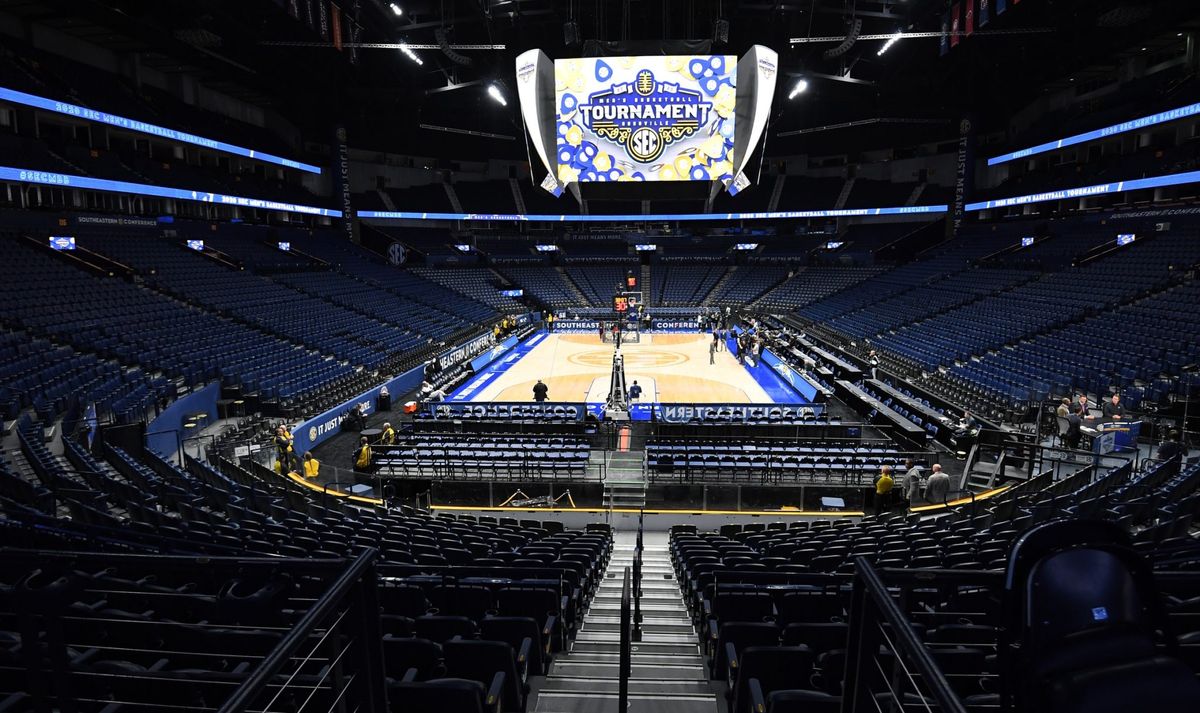NCAA March Madness returns one year after being canceled by the COVID-19 pandemic

A few minutes every morning is all you need.
Stay up to date on the world's Headlines and Human Stories. It's fun, it's factual, it's fluff-free.
After an unusual college basketball season in which many games had to be postponed or canceled altogether due to COVID outbreaks, the NCAA has enacted strict precautions for the tournament.
March 14 was Selection Sunday for the National Collegiate Athletic Association’s (NCAA) annual men’s college basketball tournament. The tournament, officially branded “March Madness,” will see the top 68 Division I college basketball teams competing in single-elimination games over three consecutive weekends until a winner emerges at the championship game on Monday, April 5.
For college basketball fans, this year’s tournament holds extra weight because a year ago the 2020 March Madness tournament was canceled due to COVID-19. It was still the early days of the pandemic and the NCAA briefly considered letting the tournament commence, possibly with no crowds in attendance, before ultimately making the unprecedented decision to cancel it entirely.
After an unusual college basketball season in which many games had to be postponed or canceled altogether due to COVID outbreaks, the NCAA has enacted strict precautions for the tournament. Those precautions include designating substitute teams in case one or more teams can’t compete and limiting attendance at the games.
With both the men’s tournament and women’s tournament taking place over the same three weekends, basketball fans will have no shortage of gameplay to watch. For medical professionals, though, the risk that the two tournaments could cause new outbreaks has forced them to enact strict tournament health and safety protocols.
March Madness 2021
On Sunday, the 68 men’s teams who were chosen to compete in this year’s tournament learned of their placement in the four-regional bracket. The first games are scheduled to begin Thursday, March 18, when eight teams compete to join the main tournament. Most years, games are played throughout the country, but this year, all games will be played in Indiana.
The tournament will begin in earnest the next day, with the First Round (or Round of 64) played over Friday and Saturday. The winners of those first 32 games will play in the Second Round (or Round of 32) on Sunday and Monday. By the end of the first weekend of games, the tournament will be whittled down to 16 teams.
The next round is known as the Sweet 16 and it will take place on Saturday, March 27 and Sunday, March 28. The Elite Eight comes next and it will take place on the subsequent Monday and Tuesday. That will lead to the Final Four, the penultimate round that will be played on Saturday, April 3, followed by the championship game the following Monday in Indianapolis, Indiana.
The women’s tournament will follow a similar schedule, though it does not have a First Four play-in round. The First Round will be on March 21 and 22, followed by the Second Round on March 23 and 24. The Sweet 16 will also be on March 27 and 28 and the Elite Eight will be March 29 and 30. Then the Final Four will be on April 2 and the championship game will be played on Sunday, April 4.
Like the men’s tournament, the women’s NCAA tournament is usually played across multiple states. This year, the entire tournament will be played in Texas, almost entirely in San Antonio, which is where the championship game will be held.
The NCAA’s COVID-19 precautions
Of course, the schedule assumes every team can play in the tournament but that is a big “if” in a year in which dozens of games were postponed or canceled and some teams had to end their seasons entirely. That has included both the men’s and women’s team at Duke University, traditionally among the dominant “Blue Blood” teams of Division I college basketball.
To help keep things on track this year, the NCAA has implemented multiple COVID-related rules. In February, the organization announced that attendance at the tournament games, which are all played indoors, would be capped at 25%. The decision to play each tournament within a single state instead of in venues across the country was also a precautionary decision made to limit exposure.
Last week, the NCAA also announced that a team only needed to have five healthy players to compete in the tournament. While only five players per team are on the court at any given time, teams generally have many more than that on the bench to substitute as needed.
If any of the 68 teams chosen for the tournament was unable to play by March 16, the NCAA had established a system by which they would substitute another team into the tournament. That did not end up happening.
Additionally, the NCAA worked with health officials to create health and safety protocols for the tournaments. Those protocols include requiring participants having seven consecutive negative COVID-19 tests before arriving at the tournament. The teams, including coaches and related staff, will stay in hotels and have all their meals in their rooms or in designated eating areas.
Tournament participants will also be required to wear contact tracing devices that will help pinpoint if anyone comes into contact with someone who has been diagnosed with the virus.
Health experts are still on high alert. Dr. Brian Dixon, who works at the Regenstrief Institute medical research institute in Indianapolis, expressed cautious optimism: “We are excited that the tournament is coming here, but we recognize that there is some risk, so we are concerned that things could get out of hand if they are not managed tightly.”
Watching the NCAA basketball tournaments
As usual, the men’s NCAA March Madness tournament will air entirely across CBS television networks, which include TruTV, TBS and TNT. The championship game will air on CBS at 9 p.m. Eastern Standard Time. The women’s tournament will mostly air on ESPN networks, though a few games will air on ABC. The championship game will be on ESPN at 6 p.m. EST.
Each tournament uses a bracket that is split into four regions. Each region has 16 teams, with each team then ranked from 1 to 16. The top ranked team in each region places the lowest ranked team, then the second ranked team plays the 15th ranked team and so on. Teams must win every game in their region to make it to the Final Four.
The top seeds in the men’s tournament are the Gonzaga Bulldogs (from Washington state), Baylor Bears (Texas), Illinois Fighting Illini and Michigan Wolverines. The Bulldogs, who went undefeated all season, are the top overall seed and considered the favorites to win the tournament. A top-seeded team has won the championship in four of the last five years, with Villanova winning as a two seed in 2016.
The women’s teams were announced on Monday, March 15. The top seeds are the Stanford Cardinal (in California), Connecticut Huskies, North Carolina State Wolfpack and South Carolina Gamecocks. Stanford is the number one team overall.
Connecticut, or UConn as it is commonly known, has been dominant in the women’s tournament in recent decades, winning the championship 10 times since 2000, including five undefeated seasons. However, UConn’s head coach, Geno Auriemma, will miss at least the first round of play this year after having tested positive for the coronavirus.
Have a tip or story? Get in touch with our reporters at tips@themilsource.com




Comments ()